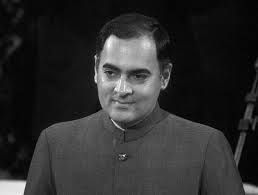 After having secured a stay on release of three convicts in the Rajiv Gandhi assassination case, the Centre on Monday moved the apex court to prevent implementation of Tamil Nadu government's decision to set free four other convicts serving life imprisonment in the case.
After having secured a stay on release of three convicts in the Rajiv Gandhi assassination case, the Centre on Monday moved the apex court to prevent implementation of Tamil Nadu government's decision to set free four other convicts serving life imprisonment in the case.
A bench headed by Chief Justice P Sathasivam agreed to hear the Centre's plea on February 27.
Additional Solicitor General Siddharth Luthra told the bench that the "substantial" petition containing names of all seven convicts have been filed today and the case be heard on an urgent basis.
The apex court had on February 20 stayed the release of three convicts -- Murugan, Santhan and Arivu-- whose death sentence was commuted to life term by it on February 18 in the case, saying there had been procedural lapses on the part of the state government on the decision to release them.
The Centre's move came after the apex court had said it could file a fresh petition regarding the other four prisoners whose sentence has also been remitted by the Tamil Nadu government.
It has sought stay on the release of convicts Nalini, Robert Pious, Jayakumar and Ravichandran.
The Jayalalithaa government had on February 19 decided to set free all the seven convicts in the assassination case.
Santhan, Murugan and Arivu are currently lodged in the Central Prison, Vellore, in Tamil Nadu and they are in jail since 1991.
The other four are undergoing life sentence for their role in Gandhi's assassination on May 21, 1991 in Sriperumbudur.
The bench had on February 20 issued notice to Tamil Nadu government, Inspector General of Prisons, Chennai, Superintendent of Central Prison, Vellore and the convicts --V Sriharan alias Murugan, T Suthendraraja alias Santhan and A G Perarivalan alias Arivu--for March 6.
The apex court had commuted the death sentence of Murugan, Santhan (both Sri Lankan Tamils) and Arivu on the ground of 11-year delay in deciding their mercy plea by the Centre.
Gandhi's assassins were convicted by a TADA court in January 1998 and were awarded death sentence, which was confirmed by the apex court May 11, 1999.
The bench had earlier expressed surprise on how the state government claimed to have fulfilled all the procedures within a day after the apex court commuted the death sentence of three prisoners.
It had said that the commutation of death sentence to life imprisonment cannot automatically result in remission of the sentence and the proper procedure laid down in the law has to be follow before releasing the prisoners from jail.
Earlier, Solicitor General Mohan Parasaran had said the procedures were not followed and the decision was taken in a hurry by the state government.
He had said the state government was not authorised to deal with the release of convicts as they were held guilty under the central laws.
He had said the state government should not be allowed to release the prisoners till the apex court decided its review petition challenging commutation of death sentence of three condemned prisoners to life imprisonment on ground of delay in deciding mercy petitions.
The court after hearing his arguments had said that all procedural checks laid down in the law have not been followed by the state government and it will examine the issue raised by the Centre.
Making it clear that it was not taking away the power of the state government to remit sentence, the bench, at the same time, had said that the states have to follow the procedures.
Senior advocate Rakesh Diwedi, who had appeared for Tamil Nadu, had strongly opposed the plea of the Centre, saying that the state government had not taken a final decision on the issue.











 © 2025
© 2025